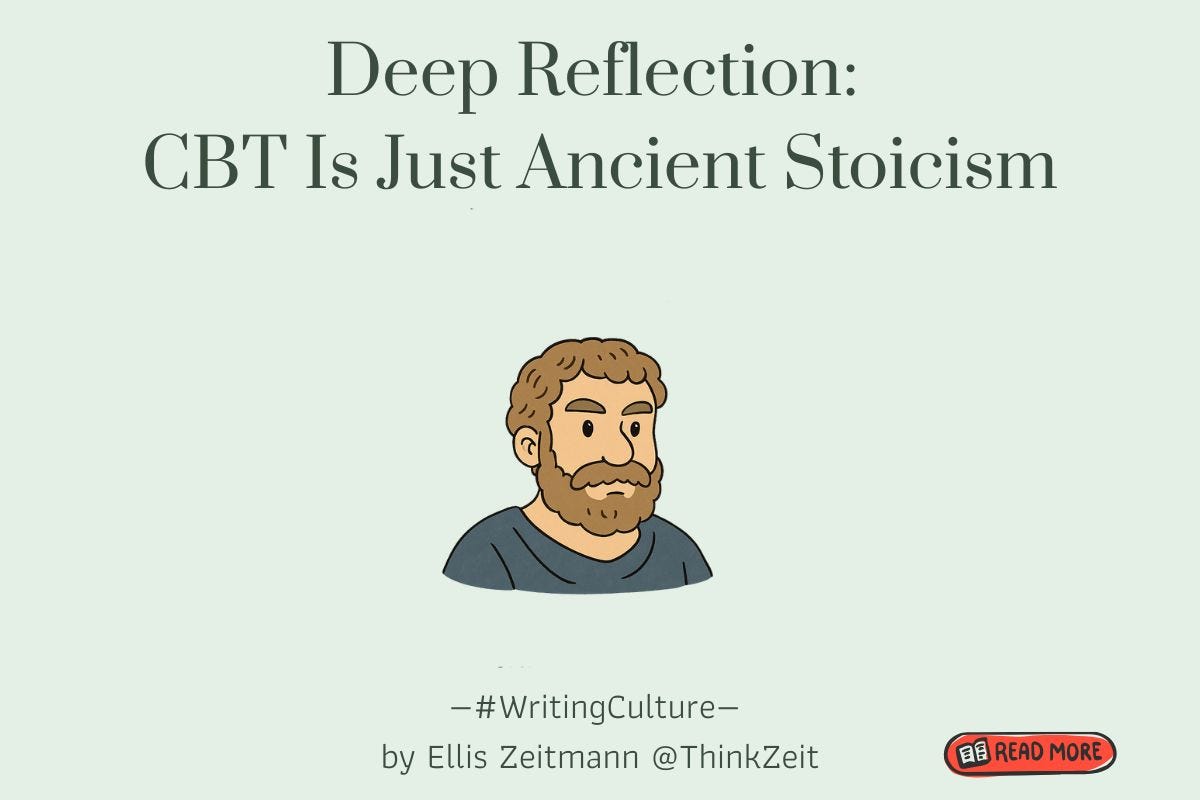Deep Reflection: The Most Modern Tools Are Often the Most Ancient #WritingCulture
On Inner Speech, Stoicism, and the Ethics of Self-Talk

✒️ What we now call "Cognitive Behavioral Therapy" began long before white coats and clinical trials. It began in dusty courtyards where Epictetus (born 50 AD) spoke not to crowds, but to souls in disorder. His lectures, recorded not as academic exercises but as acts of care, framed philosophy as therapy without anesthesia. A method for shaping how one speaks not to others, but to oneself.
And that is where everything begins.
What do you say when you speak to yourself? Does that internal dialogue serve as tyrant or teacher? Critic or quiet guardian?
CBT asks us to restructure thought patterns. But Stoicism, that deeper root, urges us to restructure our relationship to judgment itself. Where therapy seeks symptom relief, philosophy pursues something more radical: a self that cannot be enslaved by suffering.
There's something profound here that modern therapy often misses. Epictetus wasn't concerned with feeling better. He was concerned with becoming free. He didn't want calm. He wanted character, whatever the storm.
Today, mental health becomes another performance metric. We measure productivity regained, anxiety reduced. But the Stoics understood that true healing isn't cognitive correction: it's existential reorientation.
This insight didn't emerge in a vacuum. The phenomenologists knew this too. Eugene Minkowski and Ludwig Binswanger saw mental suffering not as malfunction, but as misalignment in how we experience time, space, and meaning. For them, the cure wasn't technique. It was tone.
What if the most radical intervention is not a strategy, but a stance? Not a method, but a voice that speaks inwardly with care?
The modern mind, saturated by algorithms and notifications, still thirsts for what we might call a grammar of the soul. We train ourselves to think clearly, yes. But are we learning to think wisely?
There's a moment, quiet and interior, when we realize that our internal conversation is not mere narration: it is creation itself. The words we whisper inward become the architecture of desire, fear, and ultimately, fate.
As Epictetus warned: "You become what you give your attention to."
What the ancients understood, and what we're slowly remembering, is this: This internal capacity has existed longer than any app, any therapeutic modality, any technique. It has been waiting, patient as stone, for you to remember that long before therapy was named, healing had found its expression. And it often sounded like a philosopher, speaking wisdom beneath the din of empire.
❖A Gentle Invitation
What if the voice within is not simply a psychological mechanism to optimize but the deepest expression of our humanity reaching toward wisdom?
Not a pattern to correct but a presence to cultivate. Not the failure of perfect mental hygiene but the echo of our ancient longing for freedom.
We are more than what therapy can measure. We are the conversation itself, the ancient dialogue between what we suffer and what we might become. Even when, especially when, the path toward character feels impossibly distant.
The next time your inner voice turns harsh, consider that harshness not as proof of some fundamental flaw, but as evidence of your soul reaching toward something more genuine than mere comfort. Let the difficulty become an invitation to the ancient practices rather than a retreat into modern solutions alone.
And when you witness someone else struggling with their inner dialogue, remember what you know from your own experience: they are not performing a therapeutic exercise or enacting a cognitive pattern. They are engaging in the most human of activities: the search for a voice that can speak truthfully to the self.
That search deserves nothing less than our recognition of its profound dignity.
What does your inner voice sound like today? I'd love to hear your reflections in the comments below.
If this resonated with you, please share it with someone who might need to remember the power of their own inner dialogue.
—#WritingCulture— by Ellis Zeitmann for ThinkZeit
#InkOfTheDay #DeepReflections #WritingCulture #CBT #Stoicism #InnerSpeech #Psychoanalysis #ExistentialPsychology #PhilosophyAsTherapy #MindfulSelfTalk #Epictetus #ThinkZeit #EllisZeitmann #EugeneMinkowski #LudwigBinswanger #Books #WritingCommunity


